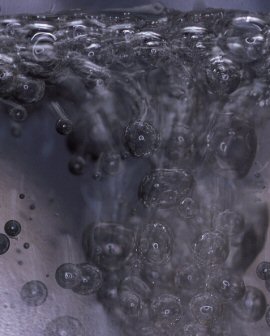11 November 2005
Volcanic Clay May Have Served As Womb For Emergent Life
by Kate Melville
 Scientists have discovered that certain clay minerals near hydrothermal vents at the bottom of the ocean can act as incubators for organic molecules. Geochemist Lynda Williams, from Arizona State University, believes her study, published in Geology, shows how some of the fundamental materials necessary for life might have originally come into existence. Williams' findings are based on research that mimicked the conditions found in and around hydrothermal vents.
Scientists have discovered that certain clay minerals near hydrothermal vents at the bottom of the ocean can act as incubators for organic molecules. Geochemist Lynda Williams, from Arizona State University, believes her study, published in Geology, shows how some of the fundamental materials necessary for life might have originally come into existence. Williams' findings are based on research that mimicked the conditions found in and around hydrothermal vents.
Hydrothermal vents are fissures in the seafloor that spew out super-hot water much like an underwater volcano. Earlier research had shown that with high enough temperatures and pressure, the volcanic emissions could produce the chemical compound methanol, one of the fundamental building blocks for life on Earth. But methanol is relatively fragile and breaks down at temperatures of 300 to 400 Celsius.
However, Williams wasn't seeing the methanol breaking down at all. She pondered what could be protecting the methanol and hypothesized that the expandable clay surrounding the hydrothermal vents might be serving as a "womb" for infant molecules, sheltering them within its mineral layers. Williams and her colleagues then devised an experiment that would test whether methanol would be protected between the clay layers.
They simulated the intense heat and pressure of the ocean floor within a pressurized vessel where the reaction of the clay and methanol was monitored over a six week period. Williams found that not only did the clay protect the methanol; it also promoted reactions that formed even more complex organic compounds. The mineralogical reaction between the clay and methanol was facilitating the production of new organic material, she explained. "This research tells us that as long as there is water and the right chemical ingredients, common clay minerals can help produce the ingredients for biomolecules [basic chemical components used by living organisms]. What makes the finding so exciting is that the experimental conditions reflect scientists' best estimations of the simplest conditions that likely existed when life began," she added.
Given that life may only need volcanic activity and water to get started, it's possible that living organisms could be widespread throughout the universe. Any volcanically active planet with water could be producing organic compounds, said Williams, who now plans further experiments to find out what chemical conditions would be required to form the building blocks of life.
Source: Arizona State University
